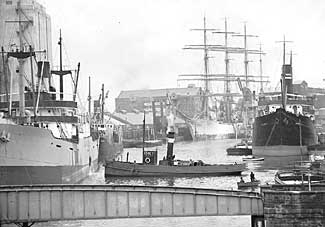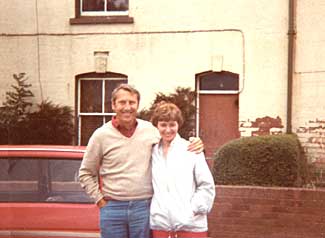 Sharpness
Dock Sharpness
Dock
In 1937, Sharpness was
busy with steamers discharging grain into the warehouses and the
silo on the east side of the dock or delivering timber to lighters
and railway wagons on the west side. Great interest was created
in June when the four-masted barque Viking arrived with 4000
tons of wheat from Australia. For young Terry Baker, the dock estate
was his playground, and he remembers with his friends:
- Dodging between the railway trucks parked next to the dockside,
awaiting the off-loading of cargo, and trying to fool the policeman
so he could fill his pockets full of peanuts to sell at school
for ten a penny.
- Climbing on to the conveyor belt in the roof of a dockside
warehouse, leaping into the grain many times, and later running
through the wheat in the warehouse trying to reach the third
and last open door before the watchman closed it for the day.
- Fishing for elvers along the tidal basin by lowering a home-made
net on a pole to scoop up the young eels which swarmed against
the dockside and then squeezing the foam out of the elvers before
frying them in butter.
- Going under the grandstand at the soccer field behind Dock
Row to look for money and things which may have fallen out of
peopleís pockets while sitting in the stands watching the game.
- Scrumping for rhubarb in the allotments next to the soccer
field.
Sharpness at War
Sharpness
played a valuable role during the war handling convoy traffic diverted
from London and also accumulating military supplies that were shipped
out for the invasion of North Africa and later for the landings
in Europe. Many of these supplies were stored in the timber sheds
under the guard of a detachment of American troops camped near the
football field. Terry Baker remembers:
- Watching the Lewis gun mounted on the top of the grain silo
shooting at a stray German plane flying over the docks.
- Watching from the shoreline while a Spitfire flew over and
fired at a barrage balloon floating in the river, having come
free from Avonmouth during a raid. He and his friends were showered
by empty shell cases and thought they were being shot at.
- Watching Spitfire pilots flying under the Severn Railway
Bridge. One crashed, and although the boys did not see it happen,
they did see the wreck of the plane at low tide.
- Seeing the US army housed in tents in the fields near the
soccer field. The boys became friendly with them and were given
a share of their rations.
- Seeing many trucks and jeeps parked across the road from
Dock Row ready for D-Day.
Visiting Harry Baker's Office
Terry
Baker did not know much about his father's work as a Customs and
Excise officer, but he does remember:
- Going into his fatherís office near the tidal basin and
being fascinated to see the jelly stuff used to reproduce documents
before the days of xerox machines.
- Updating his father's work manual for him. The revisions
came as one or two lines of new material, many to a page, separated
by perforations. These were glued into the appropriate places
in the manual, making the manual, eventually, quite tatty looking.
- Filing his father's official correspondence which was in
a binder having a string with a metal end through the top left
corner. The correspondence was pierced in the left hand corner,
and the string threaded through it. Such was the customs service
in those days.
 Dock
Row Revisited Dock
Row Revisited
In 1946, the
family left Sharpness as Harry Baker was posted to Middlesex to
set up the Customs and Excise presence at Heathrow Airport. Terry
served in the R.A.F. for three years and then worked for British
European Airways and Trans-Canada Air Lines, later called Air Canada,
who transferred him to Montreal in 1965.
On a return visit to Sharpness
in 1982, Terry and his wife Dawn found his old house, and he was
pleased to note that the residents no longer had to cross the road
to a communal pump to collect drinking water. Since retirement Terry
and Dawn live on Vancouver Island, British Columbia. |